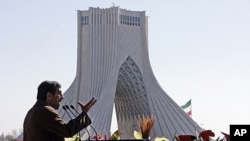The European Union has responded with a shrug to Iran's threat to cut off oil exports to some EU members several months before an EU embargo on Iranian oil takes effect. At the same time, Iran has floated an offer to resume talks on its nuclear program. Does this mean sanctions by the EU and other nations are working - or is Tehran simply playing for time?
In recent days, Iran has been sending what some see as mixed messages to Europe - and to the world - related to its controversial nuclear program.
On Wednesday, Iranian television showed President Mahmoud Ahmadinejad overseeing what was described as Iran's first home-made fuel rod being loaded into a research reactor. Iran also announced advances in its uranium enrichment program. But this week also brought news that Iran is willing to resume negotiations on its nuclear program with Europe and other Western powers.
Despite Iranian denials, many nations believe Iran is secretly using its civilian nuclear program to develop nuclear weapons. The United Nations, United States and EU have imposed a variety of sanctions in a bid to stop that.
So how should Tehran's apparently conflicting signals be read? With difficulty, says Nick Witney, senior policy fellow at the European Council on Foreign Relations.
"If you're an optimist, you can say that the Iranians are actually seriously worried - as they ought to be - about what is going to happen progressively as the year goes on, as the sanctions tighten - and are looking for a way to at least explore some sort of accommodation," said Witney.
Iran's worries not only include EU and U.S. sanctions, but also repeated reports that Israel is considering a military strike on Iran's nuclear facilities. Under this scenario, Witney says, Iranian threats could be a way to coax world powers to return to the negotiating table.
Alternatively, Witney says Iran may be determined to acquire a nuclear bomb - and negotiation offers may simply be its way to bide time.
The European Union has been pushing the diplomatic route to end the standoff on the nuclear issue. It has been steadily tightening sanctions against Tehran - aimed to cripple its financial and oil lifelines. The EU embargo of Iranian oil is due to begin July 1. Even if Iran cuts off supplies now, this EU spokeswoman told reporters that Europe isn't worried.
"If you're talking about security of supply, we say in this market that oil is something that you can get on international markets," she said. "I know that Saudi Arabia has already said that they would increase the production. So what we hear from member states is that they will switch to the other suppliers and that will be the case."
Meanwhile, media reports suggest that as its coffers dwindle, Iran is resorting to bartering to import basic foods. So are EU and other Western sanctions working? Again, analyst Nick Witney:
"I think so. I do agree the sanctions are encouraging Iran back toward the negotiating table," he said. "Now, whether they have any intention when they get back to the negotiating table to negotiate realistically is anybody's guess."
The EU is studying Iran's overture to resume the nuclear negotiations, which stopped a year ago. But Witney says Europe sees few options to resolve the standoff besides more talks - and more sanctions.
Europe Evaluates Sanctions on Iran
- By Lisa Bryant










